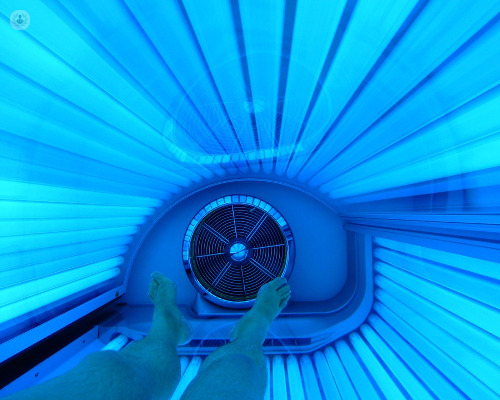


What is skin cancer?
Skin cancer is one of the most commonly occuring types of cancer. There are certain types of skin cancer. There are non-melanoma skin cancers which are a group of cancers that are slow-growing and develop on the upper layers of the skin. Basel cell carcinoma (BCC) is the most common type of skin cancer and start in the cells of the lower epidermis. Squamous cell carcinoma (SCC) accounts for around 20% of skin cancers and starts in the upper layers of the epidermis.
Melanoma skin cancer is more serious and can spread to other parts of the body.

Can skin cancer occur on the face?
Skin cancer can occur anywhere on the body, and is more common on parts of the body exposed to sunlight more often, which the face certainly is. Although moles on the face are very common, many of which are harmless, some can become cancerous. Benign moles on the face are non-cancerous and have often been present for a long time.
What are the symptoms of skin cancer?
Basal cell carcinoma:
Squamous cell carcinoma:
Melanomas will usually start with a change to normal skin or can develop on a mole already present.
You can use the ABCDE mole checklist to help determine if a mole has become a melanoma.
What causes skin cancer?
Non-melanoma skin cancers are caused by too much exposure to ultraviolet (UV) light, which comes from the sun, as well as tanning beds.
There are also a number of risk factors that can increase the chances of non-melanoma developing:
Melanoma is caused by exposure to UV light from the sun or tanning beds. Melanomas are caused by very intense exposure to UV light, such as bad sunburn on holiday.
The following risk factors increase your chances of developing melanoma:
How can skin cancer be prevented?
It is possible to reduce your chances of developing skin cancer by reducing exposure to sunlight and avoiding sunburn. You can do this by avoiding tanning beds, covering up outdoors and wearing high SPF sunscreen. You can also avoid the sun during the hottest part of the day. It is also important to check your skin regularly and notice any changes as early diagnosis increased the chances of treatment.
What is the treatment for skin cancer?
Non-melanoma skin cancer can be treated firstly by surgically removing the cancerous tumour and surrounding skin. Non-melanoma skin cancer can also be removed to using cryotherapy (freezing). They can also be treated with radiotherapy and photodynamic therapy (PDT). Treatment option depends on the size of the skin cancer, the type and the location. Non-melanoma skin cancers are often treated successfully as the risk of the cancer spreading to other parts of the body is much lower than with melanomas.
Melanoma skin cancer is treated surgically most of the time, however, treatment depends on the circumstances of your diagnosis. Early detection and treatment can successfully treat melanoma. Advanced melanoma treatment aims to slow down the spread of the cancer and improve the symptoms. Melanoma can return once treated, so regular check-ups are essential.